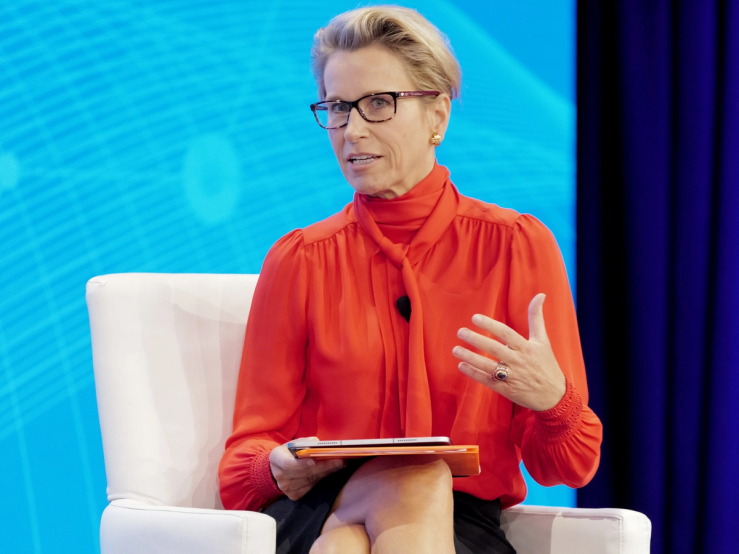The Signal Interview
“I’m not famous for my patience,” Emma Walmsley remarks, as she discusses her oversight of GSK’s AI strategy in an adviser’s office in New York. Pharmaceutical companies like hers may represent “the biggest use case” of all for the technology, she predicts, and she is anxious to see AI deliver not just efficiencies but “bigger innovation, faster” at her $80 billion-plus group.
Nine years ago this week, Walmsley was appointed — “slightly to my surprise” — to lead the UK drugmaker. “I don’t think I grew up dreaming of or believing I would end up being a CEO,” she says, but the Oxford-educated former L’Oréal executive was picked “as an insider-outsider, for a radical change and transformation agenda.” For much of her tenure, others have been equally impatient to see the fruits of that overhaul.
Investors had been restive about GSK’s performance before Walmsley’s appointment, and one high-profile UK fund manager walked away from the stock soon after she took the helm. Some shareholders urged her to spin off the consumer health division she ran before becoming CEO. She resolved in 2021 to do so, promising that a step-change in performance would follow, but GSK’s board soon found itself having to push back against an activist investor that questioned her leadership.
Like many of its industry peers, GSK has struggled to excite investors since then, but Walmsley raised the group’s long-term revenue forecasts this year, reported double-digit growth in core operating profits at its latest earnings, and says it is now “a completely different company” from the one she took over.
GSK’s pipeline of drugs in development has never been stronger, she says. And now it is “heading into a chapter of very important execution and delivery of that pipeline,” with hopes that US regulators will approve two key treatments — for asthma and multiple myeloma — in the next few months. Securing those approvals, and more over the next 18 months to offset the effects of existing drugs coming off patent, will be critical to meeting her growth goals.
GSK’s $30 billion bet on an uncertain US market
This week, timed to President Donald Trump’s state visit to the UK, Walmsley announced that GSK would spend $30 billion in the US over the next five years. The commitment, hailed by Prime Minister Sir Keir Starmer as a “powerful example” of collaboration between the two countries, was paired with reassurance that GSK would keep investing in the UK, where some of its rivals have alarmed policymakers by pausing or abandoning investments.
Walmsley, who became a Dame Commander of the British Empire in 2020, identified the US as a top priority early in her tenure, and the market now accounts for just over half of GSK’s sales, up from less than 40% when she started. “It’s a great country to invest in,” she explains: “The incentives are there, and the talent is there, and — at least to date — the market is there.”
Her caveat speaks to fresh uncertainties the current US administration has created in the world’s largest health care market. Trump has threatened tariffs on pharmaceutical imports, while his health Secretary Robert F. Kennedy Jr. has questioned vaccines’ safety. GSK was among the recipients of a presidential letter in July that told pharmaceutical manufacturers to cut prescription drug prices in the US to match the lowest price offered in other developed nations.
The US has, meanwhile, reportedly been pushing UK officials to pay global pharma companies more, to narrow the gap in drug pricing between the two countries.
Walmsley, a mother of four, says giving birth in Paris, London, and New York gave her firsthand experience of the differences between the three countries’ medical systems. She echoes industry peers in saying that GSK is “engaging constructively” with the White House.
“I completely agree that we want more Americans to have affordable access to the health care that they need,” she says, adding that there are “countries, including our own, where we’d like to see a stronger commercial environment.” At the same time, she argues “the most critical thing is that America continues to lead the world in [incentivizing] innovation in the first place, because that is how we will reduce the cost of health care.”
Reframing the politics of drug pricing
Satisfying the conflicting expectations that investors, governments, patients, and other stakeholders have of pharma companies is a game of “multi-dimensional chess,” Walmsley says. Health budgets are also “a huge allocation of national capital, and today we’re in a world where, frankly, it’s unsustainable.”
But as governments respond to those stretched budgets by targeting her industry’s pricing, Walmsley is looking to reframe the debate. “It’s not as simple as saying, look at that headline price versus that,” she says.
The treatments themselves account for a small percentage of US health care spending, she notes, with costs inflated by a “burdensome” legal environment and by pharmacy benefit managers who act as middlemen between drug manufacturers, insurers, and employers.
“What is expensive is people being sick,” she says, arguing that the best thing that governments can do to bring down the cost of health care is to incentivise “breakthrough innovation” that will keep people out of the hospital.
That applies to vaccines too, she adds, without mentioning Kennedy. “There’s no better return on investment than stopping disease before it starts. The US spends $9 billion a year in hospitalization costs [to treat] vaccine-preventable diseases,” she says. GSK is “very proud of our science,” she adds, but it is trying to engage constructively, and counter industry critics “with science, with transparency, with answering people’s reasonable questions.”
She is hoping to see reform of “the whole incentive system,” she says. “What I hope for is that our industry is properly seen as a partner, and we stop this circular round of criticism.”
Motivating an organization when trust is fragile
When Walmsley took over from Sir Andrew Witty as CEO, she named “trust” as one of her three priorities, alongside innovation and performance. Having not grown up in the industry, she says it should not be disingenuous about “the reality of some poor historic behavior” that has shaken patients’ confidence.
“We have to recognize that shouting ‘trust us,’ as a profit-generating public company, is not the way to [change minds]. We have to go step by step, stakeholder by stakeholder, understand where people’s fears and frustrations are coming from,” she says. But even as she spends time listening to the concerns of politicians and patients, she adds, she is simultaneously trying to motivate the people in her company, and external messaging is not her most important task.
“I think you make a real mistake as a CEO if you worry more about your communication than you do about the delivery of the innovation that’s the core of our purpose,” Walmsley says. Internally, she focuses on the impact that GSK’s innovation can have on patients, “and you have to trust that the communication will follow.”
Tying AI investments to a purposeful goal
What Walmsley calls “inspiring with a purpose” also lies at the heart of her thinking about AI. A Microsoft board member and self-professed “total convert” to AI’s potential for improving early diagnosis and treatment, she says CEOs need to link their investments in the new tech clearly to the benefits they see it bringing.
“I don’t want us doing AI because we want to be the most AI company,” she says: “We’re not here to be great at AI; we’re here to change lives with innovative medicines and vaccines, and AI will help us do it better.”
The technology will also improve GSK’s marketing, reduce its back office costs, and make its forecasting more accurate, Walmsley predicts, but “these are going to be table stakes” — efficiency improvements that every company will make sooner or later. “The exciting and important part in our industry is the R&D part.”
Reaping the full benefits of AI, whether in efficiency or innovation, requires “hard work, and the boring stuff,” she says, like “really detailed change management governance.” So Walmsley oversees the AI strategy personally, and monitors progress in monthly check-ins with members of her leadership team, whom she presses for “demonstrated value delivery.”
“Frankly, I do want to ramp it up another level,” Walmsley says of the AI strategy: “This is something I’m very impatient for.”
GSK has a chief digital and technology officer, but has incorporated AI goals into the evaluations and incentives of other executives, from its head of R&D to its chief financial officer. It is a team that Walmsley has put together with her insider-outsider status in mind.
“I have never believed in the CEO as superhero, [the] smartest person in the room,” she says. “When you come in as a new CEO… you have to be very clear-sighted on who you are, what you’re good at, and where you have to hire the best team in the world to accompany you on this journey.”
Notable
- Paul Hudson, CEO of rival drugmaker Sanofi, has also brought on a chief digital officer, but told Semafor he’s hoping to drive AI integration at his company through an internal working group he’s dubbed his AI “Fight Club.”


